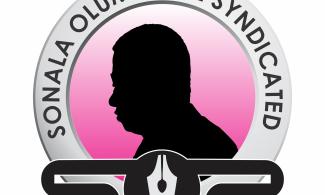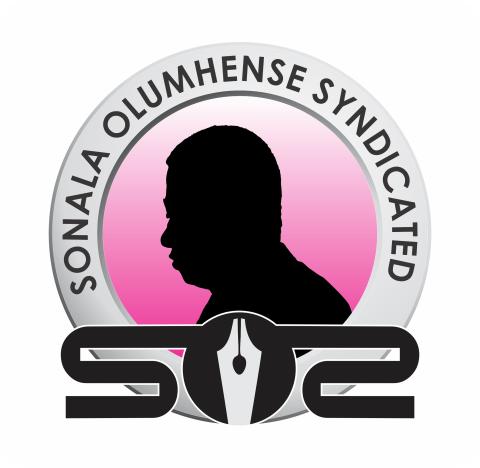
As the entire world now knows, the Nigeria Senate is toying with Ibrahim Lamorde, who chairs the nation’s Economic and Financial Crimes Commission (EFCC), which is toying with one citizen Toyin Saraki.

But Toyin is no ordinary citizen. She is the spouse of the President of the Senate and former governor of Kwara State, Bukola Saraki.
The EFCC recently hauled in Mrs. Saraki for questioning concerning allegations of fraud allegedly committed when her husband was governor, and she was said to have been confronted with a massive amount of “evidence”. You would imagine that a crime-fighting agency, armed with evidence of wrong-doing, would charge a suspect, not invite her to tea.
Just to be sure I have covered all the bases: Mr. Saraki himself has tangled with the EFCC over certain allegations of his own misdoings, but it is unclear if the cases against the man and his beloved are intertwined, like true love.
The EFCC appears to prefer a hide-and-go-seek method of corruption management: announce that someone is a suspect, broadcast an invitation to that person, and then tease, taunt, tantalize.
Which is probably why, somewhere at this very minute, Mrs. Saraki is sitting in front of the television set, bewildered but not broken.
Also deep in thought somewhere is Mr. Lamorde, who is accused by a petitioner of having diverted loads of money that had been recovered by the commission.
The hand is said to be that of Esau, that is, Bukola Saraki. But the voice of Jacob the Senate heard at a committee hearing last Wednesday was that of a man named George Uboh. He laid out a strong case suggesting that while Mr. Lamorde was scrupulous with some of the recovered resources, he had eaten some of the money, to deploy a local parlance.
Mr. Uboh is a man who has had issues with the law on both sides of the Atlantic, including the EFCC on the African side. But he makes the same compelling case against the EFCC chairman that Central Bank of Nigeria Governor Lamido Sanusi once made against the NNPC during the how-can-stealing-be-corruption era.
That case is this: Did the subject give unto Caesar all that is Caesar’s? The petitioner provides some specifics that cannot be rebutted by generalizations and accusations, so it is hoped Mr. Lamorde fights with facts and figures.
As a Nigerian, I couldn’t be happier that we have come to this extremely narrow intersection of the law and malice, or public service and vengeance. It makes for good, nation-building theatre.
Friends of Mr. Lamorde say they smell something. Until the windows are opened to admit lavish gales of fresh air, it will remain unclear whether what they smell is injustice, or abuse of power, and from what direction it emanates.
I smell something too. Mrs. Saraki has not been charged to court despite the huge “evidence” the EFCC reportedly bowled her over with. Unlike her, though, Mr. Lamorde last week ignored the invitation of the Senate, his commission later explaining it lacks confidence in the Upper House.
I completely agree that the Senate must itself play by the rules. So must the EFCC, its chairman, and all who hold public office. Our contempt for the letter of the law lies at the heart of our biggest problems.
But I have good news to share: I know how all of this is going to end.
The EFCC law demands that the commission send a comprehensive annual report to the National Assembly no later than 30th September.
According to the commission itself, that report is supposed to be a compendium of “all activities of all units of the Commission including Operations, Administration, Legal & Prosecution, Media, Accounts, Training School, etc.”
This provision of the law makes the EFCC leadership so uncomfortable that in all of the years of the commission it has only been fulfilled—or acknowledged—ONCE. That was in 2006.
When it comes to this reporting requirement, the leadership of the EFCC is a marvel to watch. To borrow the words of the late sports broadcaster Ernest Okonkwo, “they dilly, they dally; they shilly, they shally.”
In most of the last 10 years, this has been easy because of the collusion of the National Assembly, which has strangely never shown concern at not receiving the comprehensive report demanded by the law.
But this is going to end in the next 30 days. That is because in the past couple of months, the EFCC, eager to be pronounced as part of President Muhammadu Buhari’s “change,” has cut the image of a crime-busting hero.
We assume, therefore that it will fulfill all righteousness and submit that report shortly. It is that report that will tell Nigeria what the EFCC really is. Taking back the chairmanship of the commission from Farida Waziri in November 2011, Mr. Lamorde declared, "I will be making more demand of every staff of EFCC, far more demand of professionalism, integrity and ethical conduct than had ever been made of each and every one of us, and I will not accept any excuse whatsoever for failure.”
After that, the commission seemed to find a cozy spot in a political culture of rot and complicity, and it has been impossible to assess that claim. As the EFCC seemed to find comfort in doing enough, rather than the job, it has been impossible to determine why it seemed to blend into the comforts of Abuja.
But in that report within the next 30 days, Nigerians get to learn if the EFCC is a patriotic, committed government agency that was held back by a corrupt government, or if it is a conniving agency that was simply a part of a corrupt government.
When that report appears, it will become clear whether the EFCC is organized and structured to apprehend crime, or whether it is a selective and arbitrary outfit. That is why we will learn, among others, whether the funds now declared to have been misappropriated by its chairman were dutifully accounted for and audited.
In other words, for the first time in nearly 10 years, we will learn, based on the quality of the report, whether the EFCC is what it says it is.
I have expressed the view in the past that the EFCC avoids the preparation of the report because of the convoluted and complicated agenda of its leadership. This report will help us to assess the character of the current leadership.
One of the most significant recent developments is that the Senate, by instituting the probe of Lamorde through a public petition, has unwittingly declared it is ready to accommodate Nigeria’s army of petitioners. As an institution, it cannot now go back.
Speaking of institutions, it would be recalled that the Independent and Corrupt Practices and other related offences Commission (ICPC) announced in 2011 it had begun an investigation of Mrs. Waziri’s tenure, citing “disturbing evidence of corruption.” Nothing was ever heard about that again.
It would also be recalled that it is the same ICPC to which former PDP chairman Audu Ogbeh reported in 2006 that a top federal official had received a payment of N60billion in connection with the debt relief deal with the Paris Club.
As has become the general nature of crime-fighting in Nigeria, the ICPC then disappeared to go and find easier targets.
Only the truth can set Nigeria’s anti-corruption champions free.
[email protected]
Twitter: @SonalaOlumhense